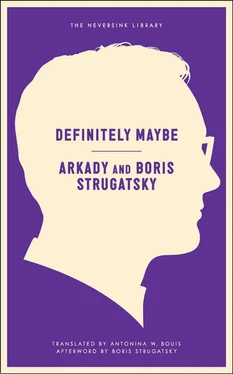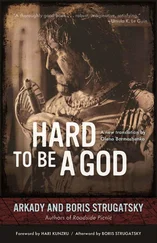I said nothing. He pulled on his funny hat with a weak, flabby gesture, and said:
“Well, good-bye, Dmitri. I guess we’ll never see each other again, but it doesn’t matter, it was very nice meeting you. And you do make excellent tea.”
He nodded and started down the stairs.
“You could take the elevator,” I told his receding back.
He didn’t turn back and he didn’t answer. I stood and listened to his footsteps, descending lower and lower, listened until I heard the door squeak open far below. Then it slammed shut, and everything was still again.
I readjusted the envelope under my arm, passed the last landing, and, holding on to the banister, completed the last flight of stairs. I stood and listened at Vecherovsky’s door. Someone was in there. I could hear voices. Unfamiliar ones. I probably should come back another time, but I didn’t have the strength. I had to finish it. And finish fast.
I rang the bell. The voices went on. I waited and then rang again, and didn’t let go of the buzzer until I heard footsteps and Vecherovsky asking:
“Who’s there?”
For some reason I wasn’t surprised, even though Vecherovsky had always opened the door to everyone without ever asking anything. Like me. Like all my friends.
“It’s me. Open up.”
“Wait.” There was silence.
There were no more voices, only the sound of someone many flights below opening the garbage chute. I remembered Glukhov’s warning about going there now. “Don’t go there, Warmold. They want to poison you.” What was that from? Something terribly familiar. The hell with it. I had nowhere else to go. And no time. I heard footsteps behind the door again and the lock turning. The door opened.
I reeled back involuntarily. I’d never seen Vecherovsky like that.
“Come in,” he said hoarsely, and stepped aside to make way.
Excerpt 21…. So you brought it anyway,” Vecherovsky said.
“Bobchik,” I said and put my envelope on the table.
He nodded and smeared the soot on his face with his dirty hand.
“I was expecting it,” he said. “But not so soon.”
“Who’s here?”
“No one,” he replied. “Just the two of us. Us and the universe.” He looked at his dirty hands and made a face. “Excuse me, I’ll wash up first.”
He left, and I sat on the arm of the chair and looked around. The room looked as if a cartridge of black gunpowder had exploded in it. Black soot spots on the walls. Thin strings of soot floating in the air. An unpleasant yellow tinge on the ceiling. And an unpleasant chemical smell—sour and acrid. The parquet floor was ruined by a round, charcoal-dirty depression. And there was another one on the windowsill, as though they had lit a campfire on it. Yes, they really had given it to Vecherovsky.
I looked at the desk. It was heaped with papers. One of Weingarten’s folders lay open in the center, and the other, still tied up, was next to it. And there was another one, an old-fashioned one with a marbleized cover and a label on which was typed: “USA-Japan. Cultural Interrelations. Materials.” And there were pages covered with what I took to be electronic schematic drawings, and one was signed in a scratchy, fuddy-duddy handwriting, “Gubar, Z. Z.,” and below it in block letters: “Fading.” My new white envelope was on the edge of the desk. I picked it up and put it on my lap.
The water in the bathroom stopped running, and a little later Vecherovsky called me.
“Dmitri, come in here. We’ll have some coffee.”
But when I came into the kitchen, there was no coffee; instead, there was a bottle of cognac and two exquisite crystal glasses. Vecherovsky had not only washed up, but he had changed his clothes. He had replaced his elegant jacket with the huge hole under the breast pocket and his cream pants with a soft suede lounging outfit. And no tie. His washed face was unusually pale, which made his freckles stand out even more, and a lock of wet red hair fell over his knobby forehead. There was something other than the paleness that was unusual about his face. And then I realized that his brows and lashes had been singed. Yes, they had really given it to Vecherovsky.
“A tranquilizer,” he said, pouring the cognac. “ Probst! ”
It was Akhtamar, a rare and legendary Armenian cognac. I took a sip and savored it. Marvelous cognac. I took another sip.
“You’re not asking any questions,” Vecherovsky said, looking at me through his glass. “That must be hard. Or is it?”
“No, I have no questions. For anybody.” I leaned an elbow on my white envelope. “I do have an answer. And it’s the only one. Listen, they’re going to kill you.”
He raised his singed eyebrows out of habit and took a sip from his glass.
“I don’t think so. They’ll miss.”
“Sooner or later they won’t miss.”
“ A la guerre comme à la guerre ,” he countered and stood up. “All right, now that my nerves are soothed, we can have some coffee and discuss the whole thing.”
I watched his rounded back and his mobile shoulder blades as he ministered to his coffee apparatus.
“There’s nothing for me to discuss. I have Bobchik.”
And my own words suddenly made something click for me. From the moment I read the telegram, all my thoughts and feelings had been anesthetized; now they suddenly defrosted and started working at full blast. The fear, loathing, despair, and feeling of impotence came back, and I realized with unbearable clarity that from that moment a line of fire and brimstone that could never be crossed was drawn between Vecherovsky and me. I would have to stop behind it for the rest of my life, while he went on through the land mines, dust, and mud of battles I would never know and disappeared in the flaming horizon. He and I would nod hello when we ran into each other on the stairs, but I would stay on this side of the line with Weingarten, Zakhar, and Glukhov—drinking tea or beer, or chasing vodka with beer, and gabbing about intrigues and promotions, saving up for a car, and eking out my existence over some dull, official project. And I would never see Weingarten and Zakhar either. We’d have nothing to say to each other; we’d be too embarrassed to meet, nauseated by the sight of each other, and we’d have to buy vodka or port wine to forget the embarrassment and nausea. Of course I’d still have Irina, and Bobchik would be alive and well, but he would never grow up to be the man I had wanted him to be. Because I would no longer have the right to want him to be that way. Because he would never be able to be proud of me. Because I would be that papa “who could have made a major discovery, too, but for your sake…” Damn that moment to hell when those stupid M cavities floated up in my brain!
Vecherovsky set the cup of coffee before me, sat down opposite me, and with a precise, elegant motion poured the rest of his cognac into his coffee.
“I’m planning to leave here,” he said. “I’ll probably leave the institute, too. I’ll hole up somewhere far away. In the Pamirs, maybe. I know they need meteorologists for the fall-winter period.”
“What do you know about meteorology?” I asked dully, while I thought: You won’t get away from it in any Pamirs; they’ll find you in the Pamirs, too.
“It’s not a difficult profession,” Vecherovsky countered. “There’s no special qualification for it.”
“It’s stupid,” I said.
“What is, precisely?”
“It’s a stupid idea,” I said. I did not look at him. “What good will it do if you become a routine technician instead of remaining a mathematician? Do you think they won’t find you? They will, and how!”
“And what do you suggest?”
Читать дальше












